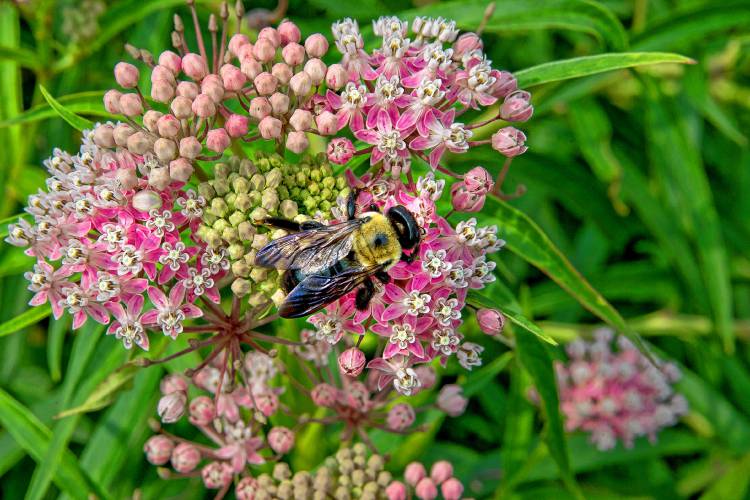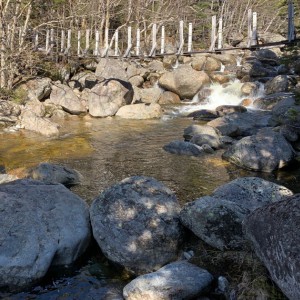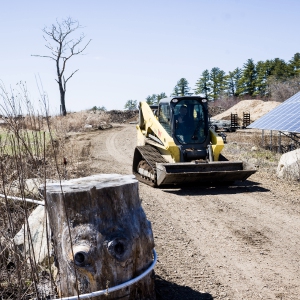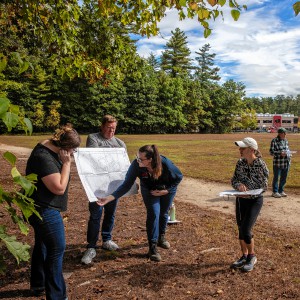Opinion: This Earth Day, help keep local land clean and healthy

A bumble bee collects pollen on flowers at Georgetown Waterfront Park in Washington in 2015. Jacquelyn Martin/ AP
| Published: 04-20-2024 8:00 AM |
Mike Cohen is the Principal Consultant for MJC HealthSolutions. Mike has served on many volunteer boards and committees in New Hampshire, contributing to efforts to improve the health and well-being of residents and protecting and preserving natural resources. He has served as a member of the Amherst Conservation Commission for five years and graduated from the UNH Extension, Coverts Project. He now is a member of the Board of Directors for the NH Association of Conservation Commissions.
This year Earth Day is 54 years old on April 22. It began in 1970, during an era of civic action when concerned citizens from all walks of life held environmental teach-ins. Around the U.S., people gathered to learn the facts about environmental degradation happening across the country. Today, we might not call the actions teach-ins, however, individuals, governments and non-profit organizations around the world are planning their own activities for Earth Day.
The NH Association of Conservation Commissions and each of its member commissions continue to celebrate Earth Day, every day, by working to protect and conserve land and natural resources and promote the use of the outdoors for pedestrian recreation.
As a board member of the NH Association of Conservation Commissions, I’m fortunate to meet dedicated conservation commissioners from every part of the state. The association has over 200 town conservation commission members overseeing a diversity of open space that supports diverse habitats and wildlife.
Each conservation commission is authorized through NH legislation, Chapter 36-A of the New Hampshire revised statutes “to assure the proper utilization and protection of the natural resources and the protection of watershed resources.” To that end, towns protect and manage the biodiversity and natural resources, and promote the public use of natural open space for low-impact outdoor recreation that is consistent with conservation.
Protecting these natural resources is a cause that a majority of New Hampshire residents support regardless of political orientation. To hunters, hikers, bikers, birders, wildlife watchers, anglers, gardeners, and /or forest stewards the conservation ethic represents cross-cutting values we hold close. These values lead us to protect and build upon our conservation heritage not only for now but for future generations.
The commissions have conserved, managed and monitored almost 180,000 acres of land in towns throughout New Hampshire which benefits clean water, clean air, wildlife and people. These acres represent diverse habitats including mountain tops, spruce, pine and oak forests, wetlands, rivers and streams, vernal pools, aquifers and grasslands.
To assure that these lands remain healthy and clean conservation commissions have developed and continuously update their management plans based on environmental science principles and practices. As an example, a number of commissions have developed and implemented Wildlife Management Plans. By protecting certain lands, the commissions works to create habitat connectivity both within and across town boundaries; that is, the degree to which the landscape promotes animal movement and other ecological processes, such as seed dispersal over a wider range.
Article continues after...
Yesterday's Most Read Articles
 ‘I thought we had some more time’ – Coping with the murder-suicide of a young Pembroke mother and son
‘I thought we had some more time’ – Coping with the murder-suicide of a young Pembroke mother and son
 The Appalachian Trail in New Hampshire just got easier, as another debate looms over replacing structures in wilderness areas
The Appalachian Trail in New Hampshire just got easier, as another debate looms over replacing structures in wilderness areas
 Senate stalls bill that would’ve eliminated annual car inspections in New Hampshire
Senate stalls bill that would’ve eliminated annual car inspections in New Hampshire
 Two Weare select board members resign
Two Weare select board members resign
 ‘We need all of you’ – New Hampshire lacks more foster families. Local recruitment efforts are trying to change that
‘We need all of you’ – New Hampshire lacks more foster families. Local recruitment efforts are trying to change that
 Owners of Lewis Farm prepare to bring back agritourism after long dispute with city of Concord
Owners of Lewis Farm prepare to bring back agritourism after long dispute with city of Concord
Growing, developing or ensuring habitat connectivity provides safe pathways for wildlife on the ground, and developing conservation policies that support this action will mean wildlife will always be able to get to where they need to go for protection, food and raising their young.
Conserving land and keeping lands and forests healthy and clean cannot be done by conservation commissions alone; it takes interested citizens to do their part.
This Earth Day is an opportunity for all of us, as individuals and members of a community, to do our part. There are a lot of ways individuals and their families can help keep lands clean and healthy; can also conserve lands and work in concert with your local commission. Here are some examples:
■Build a pollinator garden: From bees to bats and butterflies to beetles, pollinators play a pivotal role in our ecosystem. Bees are among our most important pollinators, with bee populations providing nearly one-third of our food supply and allowing wild plants to produce the foods that form the base of the natural food web. Providing the fundamental elements of wildlife habitat — food, water, cover, and places to raise young — is critical to restoring monarch butterfly habitat. By incorporating specific garden elements like native milkweed and other native wildflowers (for feeding), gardeners can create habitat in their backyards. These gardens help preserve open space in our towns.
■Fight water pollution: Even with town and state regulations, there can be problems from industry or heavy rain run-off, especially as the climate warms. If you see pollution going into our rivers or streams or overflowing our sewers, say something to town officials. Often times we are not aware that our own behavior can contribute to water pollution. Indirect or non-point sources that threaten the water supply come from construction site erosion, faulty septic systems, leaking automotive fluids, agricultural and residential fertilizers and pesticides, road sand and salt, and other diffuse sources. Dispose of these materials in an environmentally safe way.
Save water at home: Avoid flushing the toilet unnecessarily, check for leaks, do not let water run when brushing teeth, shaving, or washing dishes, take shorter showers, mulch your garden, use a drip irrigation system, do not water in the heat of day, mow the lawn at a higher level. A clean water supply helps all of us ensure that we have water should there be a drought or for us to use for filling a canteen instead of purchasing a plastic bottle with water.
■Plastics vs. planet; Learn about the impact of single-use plastics on climate change. Though they offer numerous benefits, plastics originate as fossil fuels and emit greenhouse gases throughout their life cycle, which is a very long time. One wonders where all the plastic goes. One place, oceans, now have 10 million tons of plastic dumped into them annually. As the plastic degrades it enters the food supply chain through the fish we eat and toxins contaminate the water impacting marine and aquatic life. According to research, under a business-as-usual scenario, in which policies continue to foster plastics production, the sector’s fossil fuel consumption will only increase. Today, about 4-8% of annual global oil consumption is associated with plastics, and if this reliance on plastics continues, plastics will account for 20% of oil consumption by 2050.







 Opinion: Where are the permanent solutions for a more stable budget?
Opinion: Where are the permanent solutions for a more stable budget? Opinion: My memories of Vietnam 50 years later
Opinion: My memories of Vietnam 50 years later Opinion: Concord officials: Can we sit and talk?
Opinion: Concord officials: Can we sit and talk? Opinion: Trump versus the U.S. Constitution
Opinion: Trump versus the U.S. Constitution
